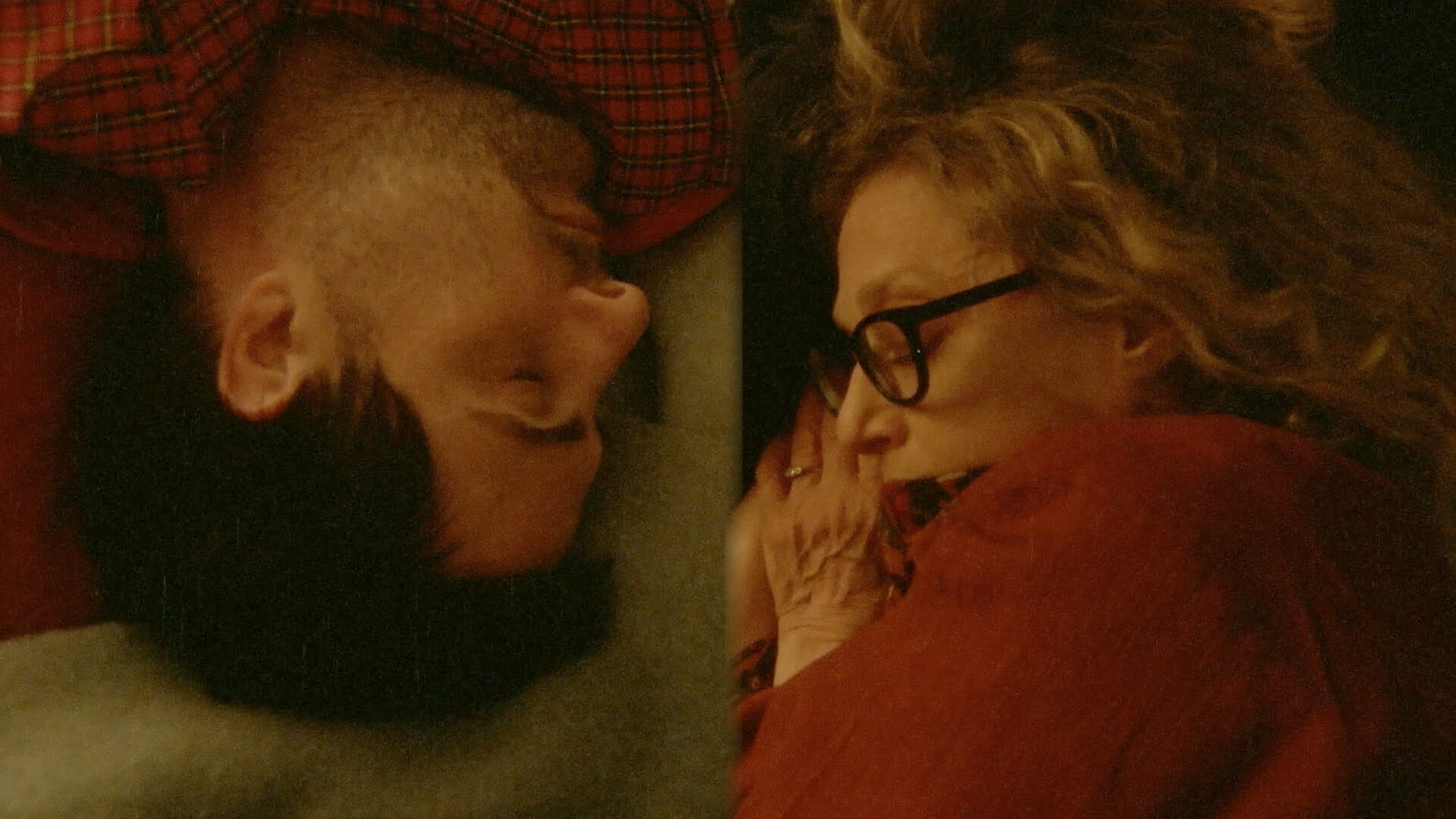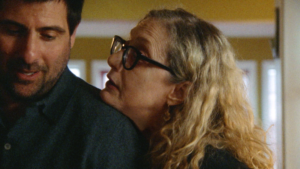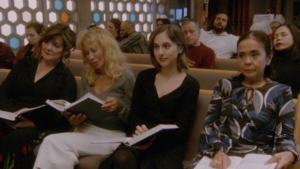In one of the most specifically Jewish movies ever made, love triumphs over loneliness
‘Between the Temples,’ starring Carol Kane and Jason Schwartzman, is an indie Chelm story and a mumblecore midrash

Jason Schwartzman and Carol Kane in ‘Between the Temples.’ Photo by Sean Price Williams.Courtesy of Sony Pictures Classics
Any Hebrew school troublemaker will tell you that Judaism takes a strong interest in sex: when to have it, who should have it with whom, how often, and why. Procreative sex is the Torah’s first mitzvah, the sages of the Talmud offer instructions on what to think about during (your wife!) and Maimonides opines on the proper lighting for erotic encounters (darkness.)
The fact that many parents are so deeply invested in their children’s romantic lives and procreative potential is so inherent to Jewish culture that most of us hardly think to find it odd. Scores of Jewish parents have drummed reproductive expectations into their children as they have the aleph-bet and the ma’ nishtana: repeated instructions to fall in love, get married, have sex, have lots of babies. When Jewish parents try, belatedly, to amend those instructions — do what I said but not with a partner with that piercing! Not with a partner with that piercing, that mother, or that opinion on Israel! — they find that it’s much too late.
This is the gentle thrust of Between the Temples, an earnest comedy that probes the limits of what kinds of love Judaism is willing to sanction. In a faith based on so many instructions, Between the Temples asks, sweetly, what happens when you try to carry out the greatest hits all at once: love your neighbor as yourself; find yourself a teacher, make yourself a friend; choose life.

Directed by Nathan Silver, who wrote the script with C. Mason Wells, the answer is a kind of an indie Chelm story, a mumblecore midrash about attempting to transcend loneliness with Jewish ritual.
Ben (Jason Schwartzman) is a geriatric millennial cantor in upstate New York who is losing the will to live, let alone to say “We join together on page 332 in the Mishkan T’filah.”
We know Cantor Ben is having a hard time because he is played by Schwartzman, Ashkenazic prince of melancholy, who displays more of an emotional range here than in many of his roles. Ben’s wife died a year ago, and in his grief he has lost his singing voice, and nearly his faith. Even after, in the pointed words of the rabbi (Robert Smigel), “a very, very long sabbatical,” he cannot squeak out the melody to Yedid Nefesh.
Ben sleeps on the foldout in his parents’ basement, barely holds down his job as a cantor, and wears his tallis around town, clutched close like a security blanket. (In a funny running gag, Ben’s drink of choice is a mudslide, a liquored up chocolate milk.) Minutes into kabbalat shabbat services, Ben runs off the bima, his tzit-tzit streaming behind him in the night air, and lies down in front of a semi-truck.
“Keep going!” he yells, when the driver slows to a stop.
Yedid Nefesh — the words mean “Beloved of the soul.” Who will be the beloved of Ben’s soul, now that his wife is gone?
His moms Judith (Dolly de Leon of Triangle of Sadness) and Meira (Caroline Aaron of The Marvelous Mrs. Maisel) have the answer: a nice Jewish girl. Among others, Ben tangles with a manic pixie rabbi’s daughter (Madeline Weinstein,) who is lustful and vulnerable and interested in seducing Ben in a graveyard, feet away from the place where his wife was laid to rest.
Mania for endogamy is played as a parody, with funny, surreal results — women appear seemingly spontaneously in Ben’s life, summoned by his mothers and his rabbi, all of them eager to date him in what feels like an accurate depiction of the way beautiful, well-socialized Jewish women find themselves going on dates with barely sentient Jewish men.
Many scenes here borrow from schmaltzy Jewish joke set-ups, and then develop richer, quasi-biblical dynamics. An early scene — stop me if you’ve heard this one before — begins when a cantor walks into a bar.
It’s a Friday night and shabbat services are still plodding along, but Cantor Ben is belly up to the bar, knocking back mudslides. A smug couple watches, tittering at the spectacle of his loneliness. Hopped up on vodka and chocolate syrup, Cantor Ben confronts them and gets punched in the face. Lying on the sticky floor, he looks up and a vision appears before him: an angel of God, a messenger of the divine, brilliant light dancing around her head.
“Can you help me?” gasps the cantor.
“Maybe!” squeaks the angel.
It’s Carla (Kane), a spry septuagenarian and Ben’s childhood music teacher. She helps Ben up, and she wants him to do the same thing for her — she is seeking an adult bat mitzvah. Carla’s married life was dictated by her husband, who wasn’t Jewish. She was recently let go from her decades-long teaching job. Her adult son dismisses her. Judaism’s obligation to welcome and even platform her feels like her last chance.

At times, Carla is wearyingly zany. But she pushes Ben to see, afresh, the beauty of Jewish ritual. “This is a job where you have to care!” she cries, frustrated, when he refuses her requests to tutor her. In an extraordinary scene, she monologues about her life, and then bullies Ben until he repeats her words back to her, like a rant-y, secular Aliyah. Soon, Ben becomes single-mindedly focused on Carla’s Jewish journey, sleeping over at her home ostensibly in the hopes of fast tracking her towards the bima.
Ben and Carla’s relationship is not apparently sexual or romantic. Still, everyone who witnesses it is made uncomfortable because it violates an unspoken community norm: that couples exist to produce children, or at least to symbolize the hope of a Jewish future. Ben and Carla are not a pairing that ensures the future of the Jewish people, but rather, a screwy, wonderful present.
Co-writers Silver and Wells achieve aching levels of Jewish specificity: Judith, Ben’s step-mom, is a convert who learns eishet chayil so she can sing it to her wife, and leverages her charisma and wealth to become a synagogue mover-and-shaker, rising to such heights of power that she gets to give the opening speech at the Holocaust Torah Restoration Fundraiser.
Some directorial choices, like liberal use of shaky cam, extreme close-ups, and constant cross-talk feel more like defiant hallmarks of indie-ness than meaningful storytelling. Others resonate, like the shofar blasts that punctuate major moments and serve as a wake up call for Ben, who has been sleeping through his life.
For most of the movie we are in the dark about what Ben and Carla want from their relationship, which is absent of much physical touch, yearning looks, or moments of tension.
It’s not the sublime passion of Harold and Maude, but the sweetness of chevruta. A spectacular shabbat dinner scene, well worth the price of admission, explodes their quiet companionship. “What the hell are you doing,” Ben’s moms, rabbi, rabbi’s daughter, and rabbi’s daughter’s mom demand to know, and if it transgresses the boundaries of a conventional clergy-congregant relationship, why do it? Ben and Carla see a spark of divine holiness in one another. To everyone looking on, their connection is sort of grotesque. (Not to mention, a professional ethics violation.)
Ben and Carla find themselves exiled from Jewish institutional life. They take their Torah into the wilderness, which is, after all, where it came from. The title Between the Temples alludes, perhaps, to the confusion and loneliness of a long exile, the longing for the construction of a more perfect Judaism, with architecture that allows for new and old tradition. While we wait, we look for soulmates.
















